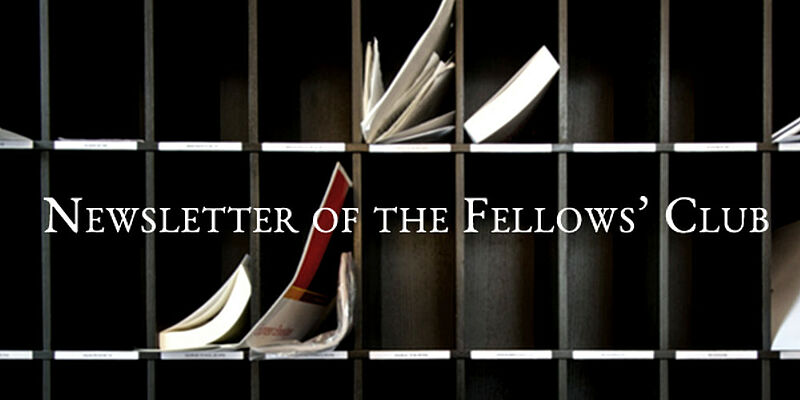
Editorial
This newsletter appears one year after February 24, 2022. The suffering and horror caused by Russia’s march on Kyiv will remain unforgettable even for those who followed it from a safe distance in the media. Since then, the world has changed, whereby it’s unclear where the changes are headed. It was the many refugees who brought the war directly home to us in Berlin. In March and April 2022, up to 2,000 refugees arrived at Berlin’s main train station alone; since then, a total of about a million Ukrainians have come to Germany. In this time, also the Wissenschaftskolleg received many requests for support. We were able to provide immediate help in the form of guest apartments and private accommodation. Three short-term fellowships were created ad hoc, and additional Ukrainian academics were aided with funds from the Marga and Kurt Möllgaard Foundation and later from the Stiftung Preußische Seehandlung.
Ukrainian Fellows had already been invited to the Kolleg in the past, for example the sociologist Viktoriya Sereda (2017/2018), whose essay on the impact of the war on Ukranian memorial culture can be read in the current issue of this Newsletter, and the historian Andrii Portnov, who today still heads the project “Prisma Ukraïna” at the Forum Transregionale Studien. But the arrival of a whole group of academics and artists directly from the embattled regions of Ukraine and their intense talks with this year’s Fellows brought Ukraine into our focus. For example when the writer Oleksandr Irvanets from the liberated city of Irpin came to Berlin and reported on his experiences. Or when Olga Shparaga of Belarus and Mohammad Al Attar of Syria discussed their — different, yet similar — experiences with Russian imperialism. When the Kyivan composer Valentyn Sylvestrov performed a cycle of piano pieces that he wrote while fleeing. Or when in an Evening Colloquium in the series “Zur Zeit” (At the Moment), the Ukrainian author Kateryna Mishchenko and the aforementioned Andrii Portnov, together with the Munich historian of Eastern Europe, Martin Schulze Wessel, analyzed the effects of the war on the Ukrainian society.
Thus, also and precisely in times of a nearby war, the Wissenschaftskolleg remained a site of encounter, even if some of the Fellows and guests had come to Berlin completely unplanned and not by choice — and seeking, not solitude and inspiration, but a temporary place to stay, where they could come and adjust to an exile whose duration was unpredictable. That was the situation not only of Ukrainian refugees, but also of a Russian dissident who managed to leave his country — despite the increasing difficulties with air travel and at borders. We hosted the Moscow author Maxim Osipov in the Kolleg for several months; in this Newsletter, he reports on his thoughts and feelings when fleeing. The encounters between refugees from Ukraine and Russland could not be taken for granted; we regard it as great good fortune that they were repeatedly possible.
The longer the war lasts, the clearer are the devastating consequences for the country — and also for Ukrainian academia. Accordingly, the Wissenschaftskolleg has resolved to contribute to preserving and reconstructing the Ukrainian scholarship and science weakened by massive destruction, flight, and energy and economic crises. In the tradition Wolf Lepenies established in the 1990s, we want to work toward founding an Institute for Advanced Study in Ukraine – as a contribution to the reconstruction of Ukraine, as an initiative countering the brain drain, and as a platform for better integration of Ukrainian academia in the international science and scholarship landscape. This exchange is in the interest not only of Ukraine. It is to be hoped that an intensified networking with the region will work to counter the West’s paltry knowledge and massive misjudgments that are part of the prelude to this war.
Professorin Dr. Barbara Stollberg-Rilinger, Rector
Professor Dr. Daniel Schönpflug, Head of Academic Programs